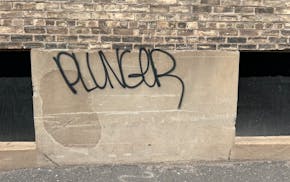The FBI and Justice Department continue to ratchet up their probe of the Metro Gang Strike Force, acquiring case files of former Strike Force members and pressing former members of the discredited unit to talk.
A federal grand jury will hear evidence on the Strike Force in February, according to two sources familiar with the investigation. The evidence is expected to include testimony from former Strike Force police.
Former members of the Strike Force have been approached by federal investigators to provide information about wrongdoing in exchange for leniency, sources said.
The investigation timetable is not clear.
Grand juries can investigate a case for months before a federal prosecutor requests an indictment, said David Lillehaug, a former U.S. attorney in Minneapolis who is not involved in the case. At other times, prosecutors may have a case largely wrapped up when they take it to the grand jury, resulting in a swift indictment, he said.
The Strike Force is being investigated by the public integrity and civil rights divisions of the Justice Department in Washington. The Justice Department recused the local U.S. attorney's office to avoid any possible conflict of interest.
Kori Land, attorney for the Strike Force advisory board, has had at least nine separate communications with the FBI, according to documents obtained by the Star Tribune under the Minnesota Data Practices Act. The board was the Strike Force's oversight body and has continued to meet monthly dealing with an assortment of issues, including lawsuits against the unit, since the Strike Force itself was permanently disbanded in July.
The contacts with the FBI were initiated in each instance by Land, she said.
Several of the communications with the FBI last summer dealt with a slim file on a target of one Strike Force investigation, Hector Garcia of Minneapolis.
Garcia has claimed that members of the Strike Force assaulted him in Minneapolis in 2007, placing a gun barrel in his mouth while demanding to know the location of drugs they said he possessed. In an interview with the Star Tribune, Garcia said he had no drugs and was never arrested.
The Star Tribune also sought documents on the case from the Strike Force, and Garcia's allegations were reported in the newspaper in July. Land spoke to the FBI before providing the file to the newspaper under the state Data Practices Act.
All available files from Strike Force investigations were scanned by the state Department of Public Safety and put on computer disc, copies of which were given to the FBI, according to Land's records.
Following up on leads
Land has been working with local departments to have missing files returned to the board.
On Nov. 18, Land created a compact disc containing Strike Force reports prepared by the Dakota County Sheriff's Office and the St. Paul and Minneapolis Police Departments. The disk was given to the FBI, according to a Land memorandum. On Nov. 23, she also created a CD of files prepared by Minneapolis police officers who were on the Strike Force, also for disclosure to the FBI.
Over the months since the Strike Force was shut down, the FBI investigation has followed up on some leads developed in the state's inquiry into Strike Force activities.
In May, the Legislative Auditor's office issued a report noting that the Strike Force was sending cars that it had seized in drug raids to Cars with Heart, a local car dealership, to be sold. Despite its name, Cars With Heart is not a nonprofit, and the Strike Force used the company without seeking bids, according to state investigations. Chris Brackey, an official with Cars with Heart, told the Star Tribune last fall that he had been interviewed by the FBI.
Ron Gardas, an owner of Twin Cities Transport, where many of the seized cars were parked, sometimes for years, told the Star Tribune that the FBI also had visited his business. "They were trying to get to the bottom of what the gang [Strike Force] was doing," Gardas said.
Randy Furst • 612-673-7382

New sober house for veterans in southern Minnesota wants to treat the real issue: PTSD
Two North Loop condos combined into one 'dreamy' space listed for $649,900

Minneapolis murder suspect arrested after decadelong escape
What to know about a possible Minnesota equal rights amendment on abortion rights
